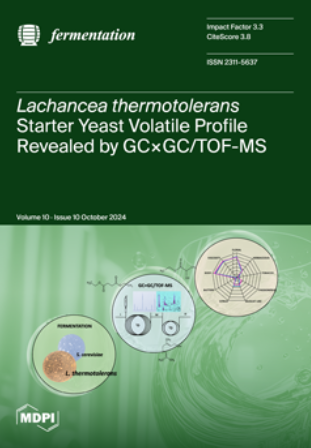Inhibitory Effects of Ammonia on Archaeal 16S rRNA Transcripts in Thermophilic Anaerobic Digester Sludge
IF 3.3
3区 农林科学
Q2 BIOTECHNOLOGY & APPLIED MICROBIOLOGY
引用次数: 0
Abstract
High temperatures exacerbate the ammonia inhibition of anaerobic digestion coupled with methanogenesis. The inhibition of methane production by ammonia has been observed in other studies. However, the underlying mechanism is not well understood and requires further investigation. This study explored the effect of ammonia stress on archaeal 16S rRNA transcripts in thermophilic anaerobic digester sludge. Different ammonium concentrations were checked for their influence on the methanogenic rate and hydrogen accumulation. Quantitative PCR was used to compare the changes in total archaeal 16S rRNA expression. A Monte Carlo permutation test within redundancy analysis (RDA) was adopted for exploring the relationship between environmental variables and archaeal 16S rRNA and their transcripts. The results showed that with the increase in ammonium concentration, the methanogenic rate decreased and hydrogen accumulation occurred. The total archaeal 16S rRNA genes and transcripts copy numbers decreased significantly in treatments with higher ammonium concentrations (7 and 10 g NH4+-N/L), but did not change much at lower ammonia concentrations (3 g NH4+-N/L) compared with the 0 g NH4+-N/L treatment. The RDA analysis further revealed that most environmental variables, including ammonia and methane, except for formate, were significantly correlated with the community structure activity of archaeal 16S rRNA transcripts rather than the community structure of their genes. The composition of archaeal 16S rRNA transcripts showed that the hydrogenotrophic methanogen Methanothermobacter dominated the methanogenic community activity in all incubations. It exhibited sensitivity to ammonia stress and should be responsible for the methanogenic inhibition under thermophilic conditions. Our findings suggested that archaeal 16S rRNA transcripts, rather than 16S rRNA genes, are key indicators of ammonia stress and methanogenic activity.氨对嗜热厌氧消化污泥中古细菌16S rRNA转录物的抑制作用
高温加剧了厌氧消化对氨的抑制,同时伴有甲烷生成。在其他研究中已经观察到氨对甲烷产生的抑制作用。然而,其潜在机制尚不清楚,需要进一步研究。本研究探讨了氨胁迫对嗜热厌氧消化池污泥中古细菌16S rRNA转录的影响。考察了不同铵浓度对产甲烷速率和氢气积累的影响。采用定量PCR方法比较古菌16S rRNA总表达量的变化。采用冗余分析(RDA)中的蒙特卡罗排列检验方法探讨环境变量与古菌16S rRNA及其转录本之间的关系。结果表明,随着铵态氮浓度的增加,甲烷生成速率降低,氢气积累发生。在高铵浓度(7和10 g NH4+-N/L)处理下,古菌16S rRNA基因总数和转录本拷贝数显著减少,但在低铵浓度(3 g NH4+-N/L)处理下,与0 g NH4+-N/L处理相比,变化不大。RDA分析进一步发现,除甲酸外,大多数环境变量(包括氨和甲烷)与古菌16S rRNA转录本的群落结构活性显著相关,而与其基因的群落结构无关。古细菌16S rRNA转录本的组成表明,产甲烷菌在所有孵育条件下的产甲烷菌群落活性均占主导地位。它表现出对氨胁迫的敏感性,应该是在嗜热条件下抑制产甲烷的原因。我们的研究结果表明,古细菌16S rRNA转录本,而不是16S rRNA基因,是氨胁迫和产甲烷活性的关键指标。
本文章由计算机程序翻译,如有差异,请以英文原文为准。
求助全文
约1分钟内获得全文
求助全文
来源期刊

Fermentation-Basel
BIOTECHNOLOGY & APPLIED MICROBIOLOGY-
CiteScore
3.80
自引率
18.90%
发文量
594
审稿时长
7 weeks
期刊介绍:
Fermentation-Basel is an international open access journal published by MDPI, focusing on fermentation-related research, including new and emerging products, processes and technologies, such as biopharmaceuticals and biotech drugs. The journal enjoys a good reputation in the academic community and provides a high-impact forum for researchers in the field of bioengineering and applied microbiology.
 求助内容:
求助内容: 应助结果提醒方式:
应助结果提醒方式:


